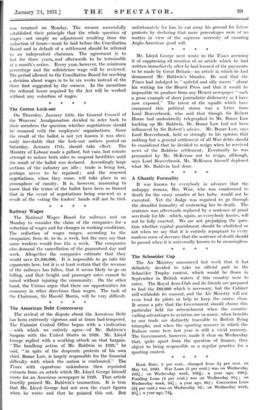Mr. Lloyd George next wrote to the Times accusing it
of suppressing all mention of an article which he had written immediately after he had learned of the payments to be made by Great Britain—an article in which he had denounced Mr. Baldwin's blunder. He said that the Times had indulged in " spiteful and silly sneers " about his writing for the Hearst Press and that it would be impossible to produce from any Hearst newspaper " such a gross example of sheer journalistic dishonesty as I have now exposed." The latest of the squalls which have composed this political storm was a letter from Lord Beaverbrook, who said that though Sir Robert Home had undoubtedly telegraphed to Mr. Bonar Law backing up Mr. Baldwin, Mr. Bonar Law had not been influenced by Sir Robert's advice. Mr. Bonar Law, says Lord Beaverbrook, held so strongly to his opinion that nothing but a general settlement of all War debts should be considered that he decided to resign when he received news of the Baldwin settlement. Eventually he was persuaded by Mr. McKenna not to resign, although, says Lord Beaverbrook, Mr. McKenna himself deplored what Mr. Baldwin had done.
* *






































 Previous page
Previous page